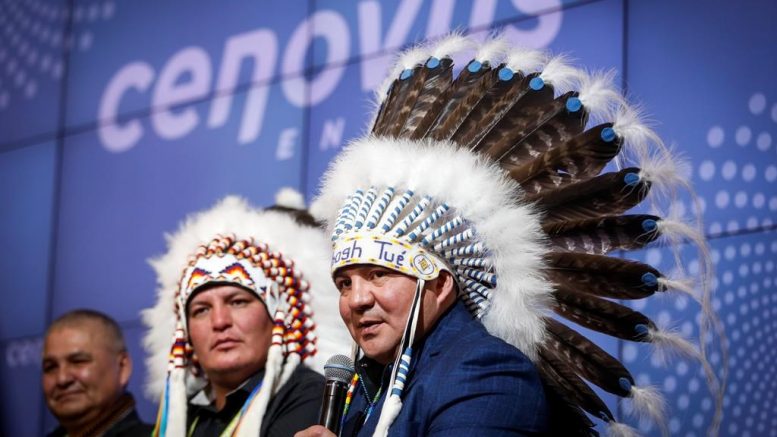Calgary, Alberta (January 30, 2020) – Cenovus Energy Inc. (TSX: CVE) (NYSE: CVE) has launched a major initiative aimed at addressing one of the most pressing issues facing Indigenous communities in Canada – the lack of adequate housing that is forcing many families to live in overcrowded and unsafe conditions.
Cenovus is committing $10 million per year for five years to build much-needed new homes in six First Nations and Métis communities closest to its oil sands operations in northern Alberta, with the potential to extend the project to 10 years. The company sees this initiative as an important way to contribute to reconciliation with Indigenous peoples.
“Investing in Indigenous communities near our operations and ensuring they share in the benefits of resource development has always been part of how we do business. Today, we see an opportunity to step up and do more,” said Alex Pourbaix, Cenovus President & Chief Executive Officer. “We can’t solve the Indigenous housing crisis by ourselves, but through this initiative, we have the opportunity to significantly improve the lives of many families currently living in overcrowded and unsafe conditions.”
Developed as part of Cenovus’s recent 10th anniversary celebration, the housing initiative is the single largest community investment in the company’s history. It’s a testament to the strong positive relationships Cenovus has built over many years working with Indigenous communities near its Christina Lake and Foster Creek oil sands projects. Cenovus has met with leaders from Beaver Lake Cree Nation, Chard Métis (Local 218), Chipewyan Prairie Dene First Nation, Cold Lake First Nations, Conklin Métis (Local 193) and Heart Lake First Nation to begin planning the implementation of the housing program starting this year.
Cenovus plans to work with leaders from the six communities to determine the most effective ways of delivering new homes based on the specific needs of each community. It’s anticipated the communities will be able to build about 200 new houses in total over five years.
Cenovus will also work with the communities to develop training programs, so that local residents can participate in the building and maintenance of the new homes. This will potentially create valuable education and employment opportunities for them in the long term. Depending on the success of the initiative, including meeting Cenovus’s performance expectations, the company may consider extending the program to 10 years with a total investment amount of $100 million.
“In addition to creating training and employment opportunities and funding the construction of new houses, Cenovus will also work with communities to raise awareness about the Indigenous housing shortage and help advocate for solutions,” said Pourbaix. “Communities have done an admirable job in managing their housing with limited resources. But this is a complex issue that will require new ideas and collaboration among many stakeholders. We hope to inspire other companies, governments and organizations to get involved.”
Separately, Cenovus has engaged its Indigenous Inclusion Advisory Committee, created in 2017 and comprised of senior leaders from various company functions, to help increase 2 Indigenous inclusion in the company’s business. Since its inception in 2009, Cenovus has signed nine long-term benefits agreements with Indigenous communities near its oil sands operations and spent almost $3 billion with Indigenous owned and operated businesses.
On January 9, 2020, Cenovus announced ambitious new targets in four environmental, social and governance (ESG) focus areas, including Indigenous engagement, climate & greenhouse gas emissions, land & wildlife, and water stewardship. A significant element of the Indigenous engagement ESG target commits Cenovus to spend at least an additional $1.5 billion with Indigenous businesses through 2030.
Cenovus also continues to provide scholarships to Indigenous youth who are pursuing a full-time degree, diploma or certified trade program. More than 190 scholarships have been awarded since the Indigenous scholarship program started in 2013.
Indigenous leaders are welcoming the announcement.
Shirley Paradis, Councillor, Beaver Lake Cree Nation stated, “Beaver Lake Cree Nation has always had housing issues. We’re at a capacity where we are trying to keep up with families’ needs. The most crucial thing is understanding that we have help now. Cenovus is stepping forward and saying: ‘We’re here to help, how do we help your community?’ There is going to be a sigh of relief for us.”
Justin Herman, CEO, Chard Métis (Local 218) remarked, “What I am taking away from Cenovus’s announcement about the new housing initiative – it’s absolutely amazing and groundbreaking, and I hope it sets a precedent for the rest of the industry to follow the lead of Cenovus. We are excited and honoured to be part of this housing initiative.”
Vern Janvier, Chief, Chipewyan Prairie Dene First Nation added, “We’re getting to the point where we have two families living in one house, and in some cases three. On top of the houses that are in disrepair, we have demand for another 50 houses. That’s how it builds up on us. And that’s just our reserve.”
Roger Marten, Chief, Cold Lake First Nations stated, “We have about 3,000 band members and only 300 homes. So, the crisis is always there and is always ongoing. The relationship has always been a great one with Cenovus; they have always listened and try to do the best they can to help us along the way.”
Val Quintal, Board member, Conklin Resource Development Advisory Committee, representing Conklin Métis (Local 193) added, “Housing is a critical need for Conklin, and we are so pleased that Cenovus has come forward to help our community address this issue.”
Curtis Monias, Chief, Heart Lake First Nation said, “I am really excited for Heart Lake. I look forward to working with all the surrounding communities, with industry, and I’m excited to build homes back home for my people.”
For more information about Cenovus’s Indigenous housing initiative, watch this video.




Be the first to comment on "Cenovus Energy pledges $50 mil to address Indigenous housing crisis in Northern Alberta"